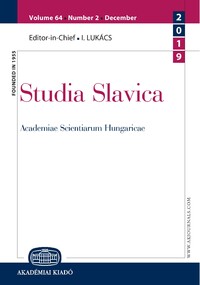Два медицинских случая – два способа самоосуществления
Two Medical Cases – Two Ways of Self-Realization
Author(s): Irina Pupysheva, Ilona KissSubject(s): Studies of Literature
Published by: Akadémiai Kiadó
Keywords: A. Solzhenitsyn; F. Karinthy; medicalization of humanitarian knowledge; M. Foucault; S. Sontag; medical narrative
Summary/Abstract: The paper compares two works of art as two medical cases. The novel by the Hungarian writer Frigyes Karinthy A Journey Round My Skull (1936) tells about the detection, diagnosis, and operation of a brain tumour, while A. Solzhenitsyn’s novel Cancer Ward (1966) is about the treatment of throat cancer and other oncological cases. Disease in them is seen as a narrative structure, and its narrative comprehension is viewed as a way of being. In both novels, the narrator is a patient opposed to the tradition of medical narrative, in which the patient is deprived of the competence to narrate. This is the novelty of the literary approach of the authors under study, who, despite all their differences, perform a kind of “ontological turn” in the history of medical narrative, creating two new models in 20th-century literature. The theoretical basis of the study was developed in the conceptual frame of the “humanistic turn” in the “power – medicine” relationships (M. Foucault and S. Sontag), when the patient ceases to be only a “controlled body” as a wordless hostage of the system. Instead, acquiring the bioethical right to speak about his own body, he gains the competence of autonarration fixed in the new models of medical narrative. The paper analyzes the prehistory and the process of creating these new models. Then evaluating the research strategies of medical narrative as such, the changing theoretical and methodological context is also examined. According to the hypothesis of the paper, a narrative of a patient who finds himself in the health care system can be defined not only as a social act but also as a speech act confirming the personal integrity and identity. In this sense, the patient’s narrative can also be considered as a mental instrument for recreating (regenerating) the disconnected “mind – body” connection. At this point, the concept of “moral landscape” was introduced as a complex of moral dilemmas of accompanying the social phenomenon. This methodological shift allowed the identification of the categorical dichotomy of the status “being human” and “being a patient”. The narrative interpretation of this dichotomy proved to be the central narrative axis in the analyzed models, and the patient’s human self is found to be the centre of narrative gravity. This latter aspect reveals a source for a pragmatic reading of the studied texts, providing fresh arguments for the discussion in the humanities about modern principles of medical ethics. At the same time, it leads to the most relevant conclusion of the analysis about the “literary transformation” of medical discourse as a way to restore and recognize the patient’s rights to autonarration and reflections.
Journal: Studia Slavica Academiae Scientiarum Hungaricae
- Issue Year: 65/2020
- Issue No: 2
- Page Range: 311-325
- Page Count: 15
- Language: Russian
- Content File-PDF

